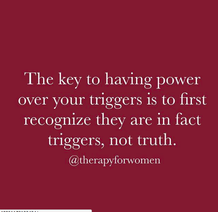 It's likely clear to anyone following my work now that I honed in on a particular obsession in my endeavors, and I don't intend on letting it go. I wrote months ago about toxic work environments in organizations that are expressly working against a toxic society. I developed a training around creating a trauma-informed workplace, and a training around trauma-informed self-care. It came back to me over and over that we cannot create social change when we as change agents are not willing to change; and we cannot be willing to change if we do not identify what needs to change; and we cannot do that hard work of identification if we are not taking care of ourselves. So, the trainings merged and now I offer Trauma-Informed Radical Self-Care for Service Providers. The name is hulking and clunky, I know. But so is the topic. I'm working on it. In April when the weather begins to change, we see more sign-ups for run/walks, bike rides, and marches for social change issues. Here in Indiana, the Indiana Coalition to End Sexual Assault dyes our downtown canal teal. Pinwheels cover the lawns of youth-serving organizations. It's Sexual Assault Awareness Month and National Child Abuse Prevention Month. Even if your organization does not directly address either of these issues, if your organization is staffed by, well, any person at all, chances are unfortunately rather high that someone at your organization is directly impacted by one or both of these topics. And April may be a hard month, or an empowering month, or both (or neither!), for them on their healing journey. Life is complicated. The Instagram account @Therapyforwomen shared this recently and I adore it. We can't know what we don't know. We can't fix what we don't know needs attention. As social media continues to transform our sense of self in ways both good and bad, more survivors are claiming their stories and sharing them with others. Maybe you are connected with a colleague on social media and see them share a #metoo post. Maybe they re-tweet a National Child Abuse Prevention Month statistic and disclose their own abuse. Many of us have had that moment with someone else where we think, "Oh no. I didn't know they had experienced {fill in the social issue here}. I hope I've never said anything to offend them. How do I treat them now?" As a lover of The Office, my mind goes immediately to Season 3, Episode 1 when Michael and Dwight find out Oscar is gay. Michael Scott: There could be others. I need to know. I don't want to offend anybody else. Dwight Schrute: You could assume everyone is, and not say anything offensive. Michael Scott: [rolls eyes] Yeah. I'm sure everyone would appreciate me treating them like they were gay! And all joking aside, I think this may actually sum up how to begin infusing our workplaces with trauma-informed care principles. I know. Stay with me. We don't need to assume anyone's sexual orientation (or level of trauma, or ethnicity, or ability, or anything else) to behave with respect. It doesn't mean we won't sometimes say the wrong thing, but it means that we are aware of how our words and actions may impact other people, who we cannot possibly know everything about. Now, not behaving like Michael Scott at your own workplace is a pretty low bar, so let's raise is a bit: how can we become aware of possible triggers in our work to our colleagues? Use these awareness raises months to do just that: raise your awareness! Read the posts you see. Familiarize yourself with the statistics. That alone will begin to shift your perception. For example, when you learn that one in three women and one in six men in the USA experience some form of contact sexual violence in their lifetime, you may be more sensitive to the fact that people around you may struggling if a big sexual assault or rape case is in the news. And, you can begin to think critically about how the work of your organization may be affected by those you've hired to deliver the programming. Ask yourself: -does my team display signs of burn-out? -are team member over-identifying with clients? Displaying symptoms similar to those they are caring for, or obsessing over certain clients while others suffer? -Do you have employees who got into this work because they have direct experience with the issue at hand? The last point is the topic of the next blog post, so stay tuned. In the meantime, how can you channel more empathy at work? Do you have a role model for that to emulate, who seems to be the opposite of Michael Scott? Begin by journaling what you admire about that person's style, how they make you feel, and analyze their leadership style. Try to incorporate one thing a day that you think they may do, if they were in your situation.
1 Comment
|
 RSS Feed
RSS Feed